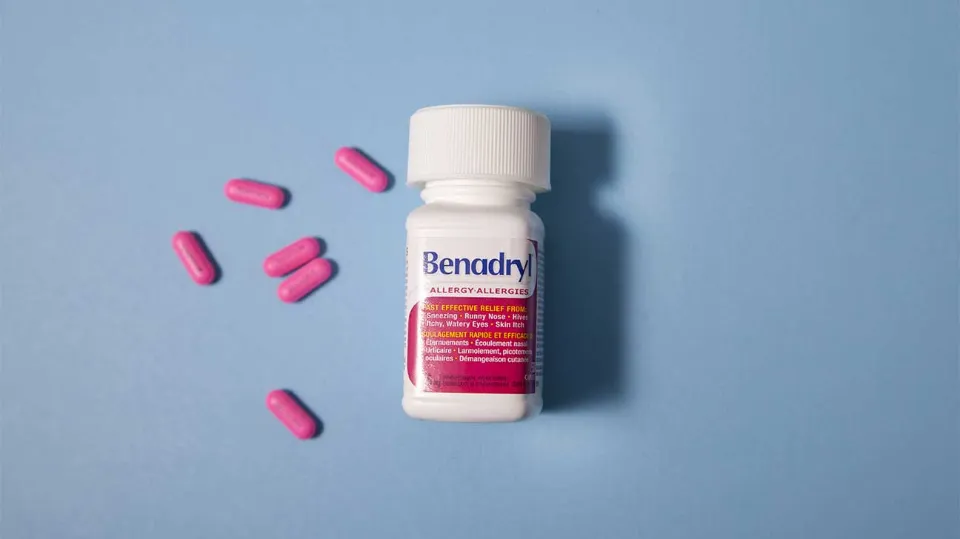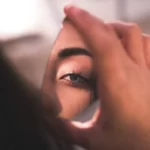Can You Take A Benadryl With Flexeril – Does It Have Bad Effects?

A well-known OTC medication is Benadryl (diphenhydramine). The symptoms of illnesses like allergies and colds are treated with it. Sneezing, a runny nose, and watery eyes are a few examples of these symptoms.
Alcohol and Benadryl can interact, just like other drugs can. When one substance makes another have an unexpected effect, this is called an interaction.
Robaxin (methocarbamol) and Benadryl (diphenhydramine), which have comparable side effect profiles, are thought to interact with each other in a moderate way. The use of them together is not contraindicated but can cause additive adverse effects and therefore, caution and monitoring are advised.
Read on for more information regarding Benadryl’s interactions. See this article for more information on Benadryl, including specifics on how to use it.

What is Robaxin?
Robexin, a muscle relaxant, is prescribed to treat acute musculoskeletal conditions’ associated pain and discomfort. The most common side effects of this medication include:
- Dizziness
- Somnolence (feeling of sedation)
- Lightheadedness
- Headaches
Robaxin’s exact mode of action is unknown, but it is thought that it has central nervous system depressant properties, which cause sedation and a decrease in skeletal muscle spasms.
Like other CNS depressants, it is advised that while taking Robaxin, individuals should not engage in physical activities that require both physical and mental alertness until they know how the medication affects them.
What is Benadryl?
The primary action of the first-generation antihistamine Benadryl is to prevent histamine from binding to receptors. A common ingredient in many over-the-counter sleep aids, including Tylenol PM, benadryl is a CNS depressant and is well known for its sedative effects.
The most common side effects of Benadryl include:
- Dry mouth
- Constipation
- Sedation
Taking Benadryl With Robaxin
Benadryl and Robaxin should generally not be taken together because doing so may cause additive side effects.
Robaxin is rapidly eliminated from the body and has a brief half-life. It would be prudent to wait at least 12 hours between To the greatest extent possible, avoid additive side effects when taking Robaxin and Benadryl.
Benadryl Interaction With Alcohol
The manufacturer of Benadryl recommends avoiding alcohol while taking the drug. This is so because drinking alcohol can make sleepiness, a side effect of Benadryl, worse. Oversleeping can make it dangerous to drive or perform other activities that call for alertness.
Other Benadryl side effects can be made worse by alcohol. Confusion, vertigo, and headache are some instances.
Before taking Benadryl if you consume alcohol, consult your doctor or pharmacist. They can assist in determining whether you might be able to take a medication other than Benadryl for your condition.
Benadryl and Other Medications
No drug interactions involving Benadryl have been reported by the manufacturer. It’s possible, though, that in the future, new interactions will be identified. New medications that interact with Benadryl, for instance, might be authorized.
Inform your doctor and pharmacist of all prescription, over-the-counter, and other medications you are taking before beginning treatment with Benadryl. You could potentially stop potential interactions by giving them this information.
Ask your doctor or pharmacist any questions you have about possible drug interactions that could have an impact on you.
Benadryl and Other Interactions
There may be additional interactions between Benadryl and things like vitamins, foods, vaccines, or even lab tests. Details are provided further down.
Benadryl Interactions With Supplements
Drugs and dietary supplements like vitamins and herbal remedies may interact.
Benadryl Interactions With Herbs
Herbs and Benadryl have not been specifically reported to interact. Before ingesting any of these items while taking Benadryl, it’s still advisable to speak with your doctor or pharmacist.
Benadryl Interactions With Vitamins
It has not been reported that vitamins and Benadryl interact. Remember to consult your doctor or pharmacist before taking any vitamins while receiving Benadryl treatment.
Benadryl Interactions With Food
There have been no reports of Benadryl and food interactions. Speak with your doctor if you’d like to learn more about eating particular foods while taking Benadryl.
Benadryl Interactions With Vaccines
No interactions between vaccines and Benadryl have been reported. You can learn more about vaccinations and Benadryl from your doctor.
Benadryl Interactions With Lab Tests
Benadryl has not been reported to interact with laboratory tests. If you’d like additional information about having lab tests while taking Benadryl, talk with your doctor.
Benadryl and Health-related Interactions

The risk of interactions with Benadryl may be increased by specific medical conditions and other elements. Before taking Benadryl, be sure to discuss your medical history with your doctor. If you suffer from certain medical conditions or other conditions that affect your health, Benadryl might not be the best course of treatment for you.
Health conditions or factors that might interact with Benadryl include:
- Breathing problems. If you have breathing issues like emphysema or chronic bronchitis, let your doctor know before taking Benadryl. These conditions might become more serious if you take Benadryl. You can ask your doctor whether it’s okay for you to take Benadryl.
- Glaucoma. Before beginning a Benadryl treatment program, discuss your glaucoma with your doctor. The medicine may make this condition worse. The suitability of Benadryl for you can be determined by your doctor.
- Enlarged prostate. Before taking Benadryl, you should consult your doctor if you have an enlargement of the prostate. It’s crucial to let them know if your condition makes it difficult for you to urinate. You might have more trouble urinating than usual while taking Benadryl. Your doctor can tell you whether the medication is a safe treatment option for you.
- Low sodium diet. Before taking Benadryl, tell your doctor if you’re following a low sodium diet. You might produce less urine or urinate less frequently than usual as a result of the medication. Your sodium levels may drop even lower as a result of less frequent urination. Benadryl safety for you can be determined by your doctor.
- Pregnancy. Pregnancy is probably safe while taking Benadryl. To make sure, talk with your doctor or pharmacist before taking the drug during pregnancy. If taking Benadryl while pregnant has any safety concerns, they can check that out.
- Breastfeeding. The drug benadryl might enter breast milk. In a breastfed child, this could cause side effects such as drowsiness or extreme crying. Larger doses of Benadryl or repeated administration usually cause these side effects. Consult your doctor or pharmacist before taking the medication if you plan to breastfeed. They might suggest a different course of treatment for your condition.
- Allergic reaction. Your physician will probably advise against taking Benadryl if you’ve previously experienced an allergic reaction to it or any of its components. Consult them regarding alternative therapies that might be more suitable for you.
FAQs About Benadryl and Interactions
Here are some frequently asked queries about Benadryl and potential interactions.
Does Benadryl Interact With Other Antihistamines Such as Claritin, Hydroxyzine, Or Zyrtec?
Zyrtec (cetrizine), Vistaril (hydroxyzine), and Benadryl are not known to interact with each other. However, unless your doctor advises it, it’s generally not a good idea to take Benadryl with any of these medications. This is so because antihistamines, which include Benadryl and all of these medications, are a class of medication. The side effects of this class of medications may become worse if you take more than one antihistamine at once. These adverse reactions can include dry mouth, headaches, and sleepiness, for instance.
See this article to find out more about Benadryl’s potential side effects. Check out this article to learn how Benadryl stacks up against Claritin and Zyrtec. Additionally, you can speak with your physician and pharmacist.
Are There Interactions Between Benadryl and Sleep Aids Such as Melatonin, L-theanine, Or Trazodone?
No, Benadryl is not known to interact with melatonin, L-theanine, or trazodone. Herbal sleep aids like L-theanine and melatonin are available. Antidepressant medication of the kind called trazodone is occasionally prescribed for insomnia.
A very frequent side effect of Benadryl is sleepiness. Taking Benadryl with melatonin, L-theanine, or trazodone could cause excessive sleepiness. As a result, it’s not usually recommended to combine Benadryl with any of these items.
Consult your physician or pharmacist before taking Benadryl if you’re also taking melatonin, L-theanine, or trazodone. If the products are combined safely, they can advise on that.
Is Benadryl Known to Interact With Blood Pressure Medications?
Benadryl and blood pressure medications don’t seem to interact with each other.
However, if you take blood pressure medication, you’re encouraged to talk with your doctor before taking Benadryl. Low blood pressure could result from taking Benadryl. Your blood pressure may drop too low if you take Benadryl along with blood pressure medicine.
It’s also important to note that Benadryl is available in combination cold products that can increase blood pressure. It’s possible that these combination products include decongestants like phenylephrine. Remember that Benadryl itself has not been linked to an increase in blood pressure.
Consult your doctor or pharmacist for more information about combining Benadryl and blood pressure medication.
Do Tylenol Or Advil Interact With Benadryl?
Tylenol (acetaminophen) and Advil (ibuprofen) have never been known to interact with Benadryl.
In fact, Benadryl is often available in combination products that contain Tylenol or Advil. Cold and allergy symptoms are treated with these products. Sneezing, a runny nose, and body aches are a few examples of these symptoms.
A doctor or pharmacist should be consulted before taking Benadryl along with Tylenol or Advil. They can help you decide if these medications are the best option for treating your symptoms.
Is There An Interaction Between Benadryl and Flonase?
Benadryl does not interact with Flonase (fluticasone).
Flonase is an over-the-counter nasal spray used to treat allergy symptoms, such as a runny nose. Benadryl is often used in combination with Flonase to ease allergy symptoms.
If you’d like to take Benadryl with Flonase, talk with your doctor or pharmacist. They can give you instructions on how to take these medications together safely.









